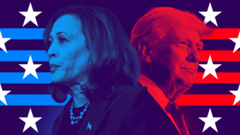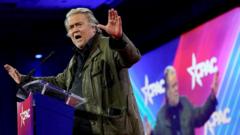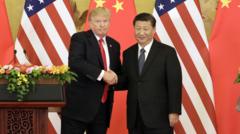A deepening gender gap is influencing the 2024 election as Kamala Harris positions herself as a strong candidate while facing challenges among male voters. The juxtaposition with Donald Trump highlights societal shifts and the ongoing discourse around gender in America.
The Gender Divide in the 2024 U.S. Election: Impact on Candidates and Voters

The Gender Divide in the 2024 U.S. Election: Impact on Candidates and Voters
As the 2024 election heats up, gender dynamics are becoming a significant factor, with Kamala Harris and Donald Trump appealing to distinct voter bases.
In the run-up to the 2024 U.S. presidential election, the divide between male and female voters is shaping up to be a decisive factor that could influence the outcome. Current polls indicate that while former President Donald Trump retains a significant lead among male voters, women largely favor Vice President Kamala Harris, creating a gender chasm that reflects broader societal changes over the past decade.
Harris, a trailblazer as the first woman of color nominated for the presidency, emphasizes her capabilities over her identity. In a recent CNN interview, she stated, “I am running because I believe that I am the best person to do this job at this moment for all Americans, regardless of race and gender.” Despite her intention to focus on her qualifications, gender remains a crucial issue in this election cycle.
Some analysts believe that Harris faces “hidden sexism” that may impede some voters from supporting her solely due to her gender, despite the reluctance to admit it publicly. Previous elections, particularly Hillary Clinton's candidacy in 2016, demonstrated the impact of gender biases, where some voters exhibited subtle apprehensions about a woman in power.
Congresswoman Madeleine Dean reflects on her past conversations with voters during Clinton's run, where an intangible discomfort was frequently voiced — a discomfort rooted in traditional views of gender roles that still linger today. Even if progress has been made since 2016, there remains a contingent of voters who balk at the idea of a commanding female presence in the Oval Office.
The cultural shifts brought about by movements such as #MeToo have altered societal expectations and norms, yet they have simultaneously provoked a backlash among segments of the male population who feel sidelined. John Della Volpe, director of polling at Harvard Institute of Politics, describes how some young men feel alienated by contemporary discussions around gender, leading them to gravitate towards charismatic figures like Trump, who speaks to their frustrations and desires to reclaim traditional masculinity.
Trump's campaign, aware of the male voter advantage, minimizes gender’s role in their narrative, instead framing Harris as too weak or out of touch. The Trump camp aims to maintain its hold on male voters by tapping into “locker room talk” and humor that resonates with traditional masculine ideals, emphasizing themes of restored manhood.
Conversely, the Democrats are attempting to attract disenchanted male voters through different strategies, calling attention to gender equality while also addressing the concerns of this demographic head-on. Barack Obama’s commentary pointed out that many men are struggling with the concept of a woman in presidential power, framing attitudes around it as outdated.
As the election approaches, the question remains: Will the inherent gender biases that influence voter perception determine the outcome? The competition is fierce as Harris strives for broader acceptance while Trump continues to harness the sentiments of his male supporters. As Harris leads among women and Trump among men, the dichotomy encapsulated by these candidates could very well shape the future of American politics.


















